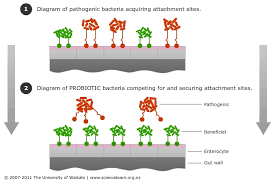If you’re all about hand sanitizer and disinfectant wipes to kill 99.9% of bacteria, then you might want to be sure to sit down to read this. It turns out that your body is home to trillions of microbes, bacteria and good tiny bugs. And that’s actually part of a healthy holistic approach to well being.
In fact, the bacteria that calls you and I home may hold the keys to improved immune systems and protecting our bodies from food and water borne pathogens.
The National Institute of Health’s Human Microbiome Project, which released its findings in 2014, is often seen as the follow-up to the sequencing of the Human Genome. Ti has even been heralded as a new frontier in medicine. Made up of trillions of bacteria that support overall human health, our gut microbiome represents the new frontier in medicine which, once unlocked, has the potential to treat or cure endless health issues. Experts suggest the microbiome affects our bodies from the time we’re born, exerting a powerful influence on key biological processes such as digestion, the immune system and the central nervous system, and consequently, can also contribute to disease. Further, research has shown that an imbalance of unhealthy and healthy microbes inside the gut may contribute to weight gain, high blood sugar, high cholesterol and other disorders associated with many health conditions, such as obesity, diabetes and inflammatory bowel disease.
Now before you decide to go evicting these tenants it might be a good idea to get to know them.
Microbes are tiny, single-cell organisms, and the ones that take care of your home outnumber the actual human cells in your body 10 to 1. Research and discussion tends to focus on those that line yourgut, but they also live on your skin, in your mouth and nose, and in your most…sensitive areas. And they’re more diverse than options from your favorite Chinese food restaurant. For example, there may be 5,000 different species that live in the human mouth.
A healthy balanced microbiome provides benefits in improved digestion, metabolism, and immunity, three elements that together tend to dictate your entire level of health.
A healthy community of gut bugs in your GI tract will effectively break down food and maintain balance there, which is crucial, since a large portion of your immune system lines its walls. If that same community is out of balance, it can lead to inflammation in the body, a condition that has been linked to a long list of chronic illnesses, like autoimmune diseases, allergies, intestinal disorders like Crohn’s and Celiac, and more.

The moment you begin to move out of the womb the microbiome starts taking shape. You acquire your first microbes coming through the vaginal canal, and breast milk contains another dose. A C-section baby or those fed formula, are slightly behind from the get-go.
Antibiotics play a big role in modern medicine and they get the job done. However, they kill indiscriminately, taking out innocent bystanders, including those healthy bacteria.
What you eat matters a lot, too. Foods that support a healthy gut environment include indigestible carbohydrates and fibers such as inulin, resistant starches, gums, pectins, and fructooligosaccharides (say that ten times fast). These fibers are sometimes called prebiotics because they feed our beneficial microbiota. Although there are supplements containing prebiotic fibers, there are many healthful foods naturally containing prebiotics. The highest amounts are found in raw versions of the following: garlic, onions, leeks, asparagus, Jerusalem artichokes, dandelion greens, bananas, and seaweed. In general, fruits, vegetables, beans, and whole grains like wheat, oats, and barley are all good sources of prebiotic fibers.
Be aware that a high intake of prebiotic foods, especially if introduced suddenly, can increase gas production (flatulence) and bloating. Individuals with gastrointestinal sensitivities such as irritable bowel syndrome should introduce these foods in small amounts to first assess tolerance. With continued use, tolerance may improve with fewer side effects.
Research is showing microbes love foods fermented with their own microorganisms, like kefir, yogurt, kimchi, tempeh, sauerkraut and Kombucha.
What about probiotics? Dr. Allan Walker, Professor of Nutrition at the Harvard Chan School of Public Health and Harvard Medical School, believes that although published research is conflicting, there are specific situations where probiotic supplements may be helpful. “Probiotics can be most effective at both ends of the age spectrum, because that’s when your microbes aren’t as robust as they normally are,” Walker explains. “You can influence this huge bacterial colonization process more effectively with probiotics during these periods.” He also notes situations of stress to the body where probiotics may be helpful, such as reducing severity of diarrhea after exposure to pathogens, or replenishing normal bacteria in the intestine after a patient uses antibiotics. Still, Walker emphasizes that “these are all circumstances where there’s a disruption of balance within the intestine. If you’re dealing with a healthy adult or older child who isn’t on antibiotics, I don’t think giving a probiotic is going to be that effective in generally helping their health.”


Leave A Comment